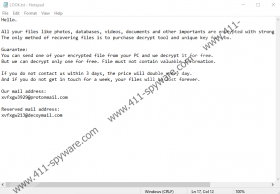PXJ Ransomware Removal Guide
PXJ Ransomware is a new infection that we are adding to our blacklist. It is an infection that can harm your most personal files, such as documents or photos, and it can do that with the help of an encryptor. An encryption key is employed to change the data of the files to ensure that they can be read only if a decryptor is employed. Normally, this is a great method to protect your files, but the attackers are using it to their advantage. There are literally thousands of infections that can do the same, and some of the more recent of them are Remk Ransomware, Hentai Onichan Ransomware, and Lokd Ransomware. Our research team is working hard to detect and report all of these threats to make sure that you always have the information you need. Of course, our hope is that no one will need to delete PXJ Ransomware from their systems, but if that is what is going on, keep reading.
Did you know what opening spam email attachments and using bundled downloaders introduced via unreliable websites is dangerous? These are the main methods of distribution that are used to spread PXJ Ransomware and other similar threats. Unfortunately, it is usually enough to click one button carelessly for the threat to execute. After that, if trusted security software does not exist to detect and remove malware immediately, the infection encrypts files. The “.pxj” extension is added to mark them, and so it should be easy enough for you to figure out which ones of your files were corrupted without having to try to open them. Next to the files, you are likely to find the “LOOK.txt” file, which is a ransom note dropped by PXJ Ransomware. If you open this file, you are informed that you have to email xvfxgw3929@protonmail.com or xvfxgw213@decoymail.com to receive information about a ransom payment. We hope that you understand that following the instructions and paying a ransom will not get you a decryptor.
The cyber attackers behind PXJ Ransomware are ready to tell you just about anything to get your money. If they thought it could help, they would promise you unicorns and coronavirus cures. In this case, they are promising a decryptor in return for your money. You are urged to pay a ransom within three days, after which, the undisclosed sum of the ransom is meant to double. After one week, your files are meant to be unrecoverable. The horrible thing is that free PXJ Ransomware decryptors did not exist at the time of research, and so for many victims, the solution offered by the attackers might be the only solution. Even if that is the case, we do not recommend contacting the attackers and paying the ransom. You do not need to contemplate this if you already have backup copies. More and more people create copies of files online for easy access or on external drives to clear space on desktop computers and laptops. If you have backups, delete the infection and then use them to replace the corrupted files.
You have two main options when it comes to the removal of PXJ Ransomware if you do not have friends that can help you or you do not want to hire an expert to clean your Windows operating system. In our opinion, that would be a waste of money. The best investment you can make is in legitimate anti-malware software that can automatically delete PXJ Ransomware and secure your operating system at the same time. If you successfully remove the threat but do not secure the system, you are at risk of facing new infections, and they could be damaging in the same or completely new ways. If you end up losing files completely – which is likely to happen even if you pay the ridiculous ransom – remember to create copies of the new files you create. Store them outside the computer, and you will never lose personal files to malware again.
How to delete PXJ Ransomware
- Identify the {random name}.exe file that executed the infection.
- Right-click the malicious file and choose Delete.
- Right-click and Delete the ransom note file, LOOK.txt.
- Click the Download button below to install a free malware scanner.
- Inspect your system for malware leftovers.
PXJ Ransomware Screenshots:


